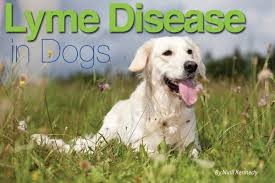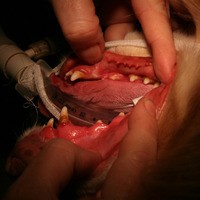
Dogs and humans have always been best of friends for so long. Dogs have been our faithful and loyal companions and we must in turn, take good care of them. We are mainly responsible for keeping them healthy and happy. It is important to know the early symptoms of serious health problems of our pets, which include the Lyme disease symptoms in dogs that may be fatal if not treated at once.
Lyme disease is caused by a bacterium that is commonly transmitted to a dog through a bite of tick. This is usually characterized by lameness, swollen joints, and fever. Dogs may also limp. The sudden appearance of painful lameness shifts from one leg to another would lasts for 3 to 4 days. This may disappear eventually, but if remained untreated, will recur weeks or months later. In some pets, the symptoms would only occur after a year, which by this time may have already spread throughout the body. Antibiotic treatment is every effective, once the diagnosis has been established.
Urinary tract infection (UTI)

Female animals are generally at risk of developing urinary problems as they got shorter urinary tract. UTI occurs in any part of the urinary tract and is treatable with antibiotics. Infection can lead to irritation that can cause the urge to urinate frequently than usual. If you see these signs at your pets, better see your veterinarian for check-up. Treatment for lower UTIs is oral antibiotics, while upper UTIs require intravenous antibiotics.
Obesity

We always find our pets very huggable when they are big and chubby. Like the human population, obesity poses a serious problem to our dogs. Pets that are overweight are easily prone to arthritis, diabetes, heart diseases and untimely death. Obesity is often caused by being overfed and not having any exercise at all. Help you dog live longer by giving them the tools to be light and healthy.
Arthritis

Senior dogs typically suffer arthritis, the inflammation of the joints, which affects their ability to move. They are quite hesitant to leap to their favorite spot in the sofa, or seem to rise slowly in the morning. It is very important for the dog to maintain a healthy weight by exercise, and a good diet. A regular exercise or an active therapy would help build up the muscles and bones. This would also avoid the stiffening of joints due to lack of use. Dog arthritis does not have a cure, but the progress can be controlled in many ways. There are also joint supplements and pain management to control its progress.
Rabies

Rabies is one of the most life-threatening viral diseases that attack the central nervous of animals, particularly causing inflammation in the brain. It is commonly transmitted from the saliva of an affected animal, mostly dogs, through biting, and transmitted among mammals. Once infected, the incubation period usually takes 4 to 12 weeks for a person to develop the symptoms. It is very important to always maintain your dog’s vaccination, as rabies is always fatal.
Kidney Disease

Kidney disease is commonly seen in senior dogs and thought to be part of the aging process, but is now also seen in pets of any age. It is an aggressive and distressing disease that can be congenital or develop as the dog gets older. Conservative veterinary medicine considers canine kidney disease to be irremediable, while the kidney failure is frequently fatal. Annual blood evaluation is generally done to monitor the kidney condition.
Diabetes

As part of the aging process, dogs can develop diabetes, just like humans. Increase in water consumption and increased urination are the most common symptoms in dogs. Diabetes in our pets usually can be controlled by giving them the right diet and proper exercise, but other pets would require daily shots of insulin to control blood sugar levels.
Distemper

Distemper is a highly infectious, distressing and often fatal disease of dogs. It is spread from dog to dog by contact with saliva, urine or feces and even objects that become contaminated with bodily fluids of infected animals. The virus attacks the dog’s brain cells, the skin, lungs and internal systems. Symptoms are very mild, even none at all. The disease, however, can be prevented with a vaccine. Puppies are vulnerable, that’s why they should be vaccinated once they are at least 5 to 6 five or six weeks old.
Parvovirus

Parvovirus, commonly known as “Parvo” is a highly contagious common virus and is most frequently seen in puppies that have not yet been vaccinated. It can also infect a dog of any age. The viral disease attacks the dog’s digestive system causing vomiting, diarrhea, and dehydration, and oftentimes death. A puppy should be vaccinated during its first year, and once his initial vaccination has been completed, he should be given booster shots annually to maintain his immunity.
Gingivitis

Proper dog dental care is essential to our dog’s health as dental problems such as cavities, tartar, and irritated gums can affect their heart, kidney and lungs. Plaque buildup on a dog’s teeth, like people, can lead to inflamed gums related with gingivitis. A regular dental cleaning is needed to keep their teeth and gums healthy. Your dog’s dental care should begin in his puppy phase of life. Some good ways to limit plaque buildup is by giving them nylon bones, chew toys, and a balanced diet of dry foods.
Heartworm

Heartworm is a parasitic worm that is passed by mosquitoes and is common to dogs, wolves and foxes. It invades the pulmonary arteries and heart of the affected animals. Symptoms of the disease may include fatigue after moderate activity, weight loss, mild persistent cough, and loss of appetite. Dogs that are infected with heartworms have good chances of recovery with an expensive treatment. To be free from these deadly worms, a monthly preventive prescription by your veterinary is necessary.
The most common serious ailments of dogs can be prevented and controlled with proper attention by the pet parent with the help of a professional veterinarian. It is of great importance to recognize the symptoms of the diseases, which may turn our fatal, if left ignored.